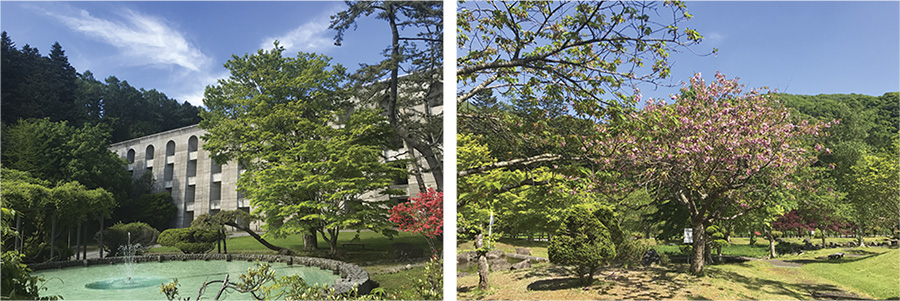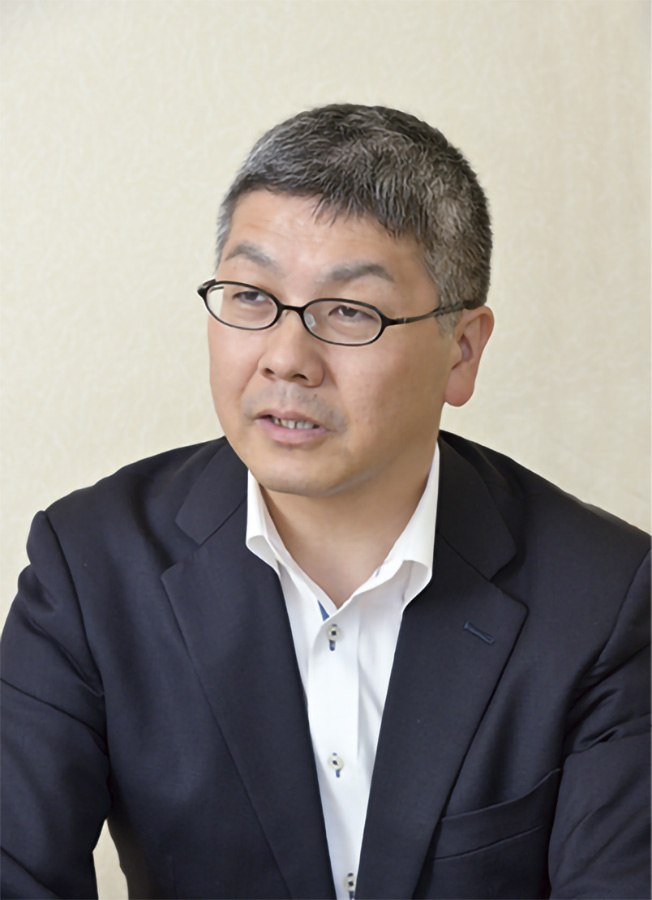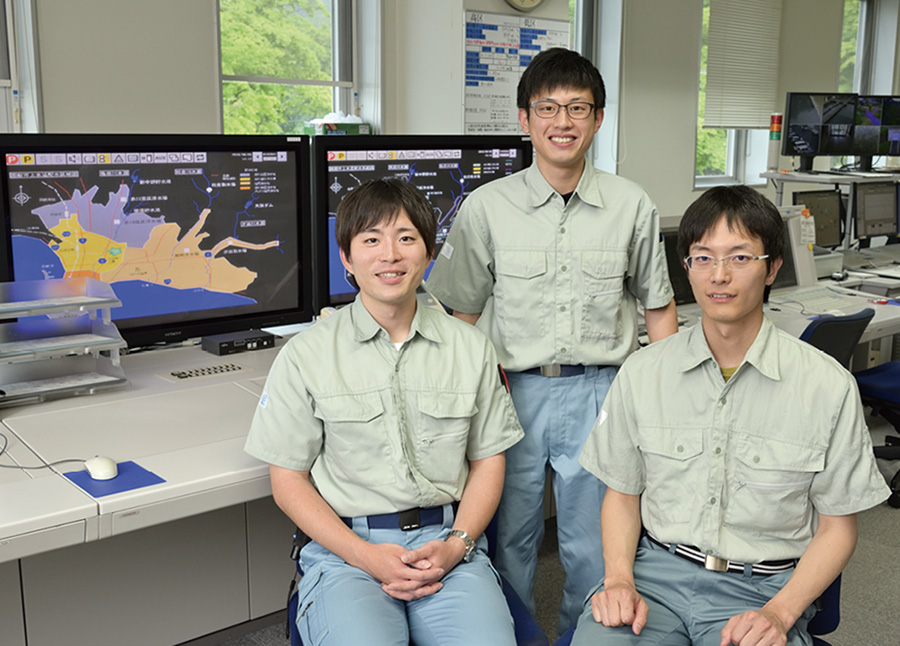COVER STORY : ACTIVITIES2
Contract to Upgrade, Operate, and Maintain Water Purification Plants at Hakodate
Revisions to Japan’s Water Supply Act have led to an increase in collaboration with the private sector by water utilities, which are predicted to face difficult operating conditions in the future due to factors such as the need to deal with natural disasters and aging equipment and a worsening fiscal position resulting from population decline. Hitachi, with past experience of public-private partnerships in the water industry, has won a contract from the Hakodate City Enterprise Department in Hokkaido for the upgrade, operation, and maintenance of water infrastructure. The project commenced in April 2019. In this article, the staff involved on the front line of this collaborative venture, from both the city and Hitachi, explain the nature of the contract and its aims, as well as the plan for the future.
Factors such as the rising cost of upgrading aging infrastructure and falling usage revenues resulting from population decline are creating an increasingly difficult business environment for municipal water operations. In light of this situation, Japan revised its Water Supply Act in December 2018. The three key revisions were to promote regional integration to enable efficient operations by harnessing economies of scale, to promote appropriate asset management to serve as a basis for the planned upgrading of water pipes and making them more earthquake-resilient, and to promote diverse public-private partnerships to take advantage of private-sector technical skills and operational know-how. Public-private partnerships were highlighted as a practical measure for achieving these aims in the New Water Supply Vision that was revised in 2008, with great expectations for using the ingenuity and expertise of private-sector businesses to help deliver efficient and sustainable operations.
Public-private partnerships can adopt a variety of different business models, including partial outsourcing, full outsourcing, private finance initiatives (PFIs), and concessions. Having been involved in a wide range of projects as a full-service provider for the water industry, Hitachi has participated in a number of public-private partnerships, including a PFI project with Yubari City in Hokkaido and a comprehensive outsourcing contract for water and sewage operations with Toda City in Saitama Prefecture.
Hitachi has now launched a new public-private partnership initiative with Hakodate City in Hokkaido.
After Yokohama, Hakodate was the second city in Japan to install a water supply system, which it did in 1889. Since then, the system has undergone a total of six upgrades to cope with increasing demand. Having inherited nine smaller water supply systems following a merger in 2004 that incorporated four outlying towns, the utility now manages 13 water purification plants scattered about the city and supplies water to approximately 260,000 people (as of March 2018) (see Figure 1).
Operationally, the utility currently has a stable revenue base, as indicated by the fact that it hasn’t revised its pricing since 1994. Nevertheless, like other local governments throughout Japan, it is anticipating difficult times ahead due to the aging of water purification plants, pipes, and other infrastructure and other challenges such as the handing on of skills and expertise.
In anticipation of these future challenges, the Hakodate City Enterprise Department has used the planned upgrading of one of its primary water purification plants (Akagawa Koku Water Purification Plant) as an opportunity to issue a request for proposals (see Figure 2).
The 2017 to 2026 Hakodate City Vision for Water and Sewage included a target of facilitating sound operations and considered the use of public private partnerships, PFIs, and other ways of building infrastructure that draw on the vitality of the private sector, looking to use the Akagawa Koku Water Purification Plant Upgrade Project as a model for such arrangements before they were tried elsewhere in Japan. The scope of the project extended from upgrading the mechanical, electrical, and instrumentation equipment at the Akagawa Koku Water Purification Plant and other water supply facilities, to a 20-year contract for operation and maintenance, and managing the parks and water conservation forests on the water purification plant sites (see Figure 3).
Along with investigating cost savings based on the above vision, and given that the infrastructure installation and running costs were in line with the Hakodate City rules on preferential consideration of PFI arrangements, the City Enterprise Department looked at options that included design build operate (DBO) arrangements and decided that the benefits of DBO made it the best way to proceed with the project.
Masataka Nishiyama (Engineer, Water Treatment Section, Water and Sewage, Hakodate City Enterprise Department), whose responsibilities include water purification and who has been involved from the outset in basic planning for the request for proposal, explains the reasons for this as follows.
“The design and supervision of the project to install remote control and upgrade the slow filtration tank at the Akagawa Teiku Water Purification Plant fell under the jurisdiction of our department and we chose to undertake the work ourselves. Given the complex control required for the Akagawa Koku Water Purification Plant, however, we opted instead for a DBO arrangement in which a private-sector company would undertake design and supervision based on their submitted proposal. The reasons for this decision included a desire to draw on the technical skills of the private sector with its extensive know-how and also to reduce the amount of work we ourselves would have to do on the installation.”
Given that DBO involves private operation of public assets, another consideration behind the adoption of such an arrangement was that, along with the objectives of cost savings and efficiency improvement, because providing infrastructure is a public sector responsibility, it is the job of the City Enterprise Department to ensure the supply of water. In its response to the request for proposal, Hitachi worked with two other companies: Tomioka Denki Koji, Co., Ltd. and Hitachi High-Tech Fielding Corporation.
Figure 1 Map of Hakodate Water Infrastructure The utility manages 13 water purifi cation plants scattered across the city and supplies water to approximately 260,000 people (as of March 2018).
The utility manages 13 water purifi cation plants scattered across the city and supplies water to approximately 260,000 people (as of March 2018).
Figure 2 Present-day Akagawa Koku Water Purifi cation Plant in Hakodate In addition to the existing plant, the project also includes plans to upgrade a monitoring and control system in a new fi ltration tank facility to be built at the site.
In addition to the existing plant, the project also includes plans to upgrade a monitoring and control system in a new fi ltration tank facility to be built at the site.
Figure 3 Sasanagare Dam and Adjacent Park The contract also included management of the parks and water conservation forests on the water purifi cation plant sites.
The contract also included management of the parks and water conservation forests on the water purifi cation plant sites.

Masataka Nishiyama
Engineer, Water Treatment Section, Water and Sewage, Hakodate City Enterprise Department

Kazuki Honda
Engineer, Water Treatment Section, Water and Sewage, Hakodate City Enterprise Department

Kazuma Sasaki
Engineer, Water Treatment Section, Water and Sewage, Hakodate City Enterprise Department
Hitachi had previously worked with Hakodate’s water utility on joint public-private projects. Jun Endo (Assistant Manager, Infrastructure System Sales Department, Hokkaido Area Operation, Hitachi, Ltd.), who was involved in a sales role from the early stages, explains the background to Hitachi’s decision to participate in the request for proposals as follows.
“After initially winning a contract for operational management of small water supply systems in the eastern district in 2012, and subsequently of the Akagawa Koku and Akagawa Teiku Water Purification Plants in 2016, Hitachi was also involved in a small hydro power project at the Akagawa Koku Water Purification Plant. This work provided an excellent opportunity to gain an accurate understanding of the challenges facing Hakodate, and we felt that the knowledge Hitachi had gained on the ground would serve us well in the Akagawa Koku equipment upgrade.”
The operational management work in the eastern district served as a starting point, and with the associated participation by Hitachi staff in regular meetings helping build trust between the two sides, there were also numerous instances in which working together proved effective (see Figure 4). Kazuki Honda (Engineer, Water Treatment Section, Water and Sewage, Hakodate City Enterprise Department), who worked on the operational management of the eastern district water supply system, had the following to say looking back at the collaborative relationship.
“Prior to the contract, our small team needed to handle considerable work that included dealing with billing, inspecting engineering work, and maintaining the pipes and water purification plant for nine small water supply systems with a wide geographical spread, making it difficult for us to focus on water purification plant operation. As a result of outsourcing operations and other work to Hitachi, however, I believe that our water supply infrastructure has become more robust, including disaster response. Examples include when a pump failed at Toi Water Purification Plant and when conduit pipes leaked at Kinaoshi Water Purification Plant, both plants are located in Hakodate, in which cases we were able to leave operations to Hitachi and concentrate instead on dealing with the fault or leak. By dividing responsibilities between us and acting accordingly we were able to avoid disruptions to the water supply.”
This experience is reflected in the proposal for the new contract. Jun Endo noted how the document took account of things like the city’s finances and included measures that were based on a long-term view. Following consideration of their proposal by the bid evaluation committee, Hitachi was named the preferred bidder and a special-purpose company named Hakodate Aqua Solution, Ltd. was established by the three partners (Hitachi, Tomioka Denki Koji, and Hitachi High-Tech Fielding). The contract for the Akagawa Koku Water Purification Plant Upgrade Project was then signed with Hakodate City Enterprise Department (see Figure 5). Osuke Yunoki (Senior Engineer, Service Business Promotion Department, Water Solutions Division, Water & Environment Business Unit, Hitachi, Ltd.) is based in Hakodate and handles overall project coordination of the public-private partnership with Hakodate City, which started with a contract to operate small water supply systems. He expressed his sense of how important the project is for Hitachi as follows.
“Given that it is set to continue for the next 20 years, this DBO project will almost certainly face new challenges in the future, with changes in the commercial environment in Hakodate being inevitable. The restructuring of operational practices will be key to overcoming these challenges. Making use of technologies such as digital solutions that support operation and maintenance (O&M) to improve efficiency and overcome issues in consultation with the customer will be a major challenge for us at Hitachi.”

Jun Endo
Manager, Infrastructure System Sales Department, Hokkaido Area Operation, Hitachi, Ltd.

Osuke Yunoki
Senior Engineer, Service Business Promotion Department, Water Solutions Division, Water & Environment Business Unit, Hitachi, Ltd.

Satoshi Naganuma
No. 2 Eastern Systems Technology, Corporate Systems Department, Water Solutions Division, Water & Environment Business Unit, Hitachi, Ltd.

The project got underway in April 2019. The schedule is for equipment design to take place in FY2019 with installation commencing from the following fiscal year and management work to start two years later.
The three things Hakodate City Enterprise Department is expecting from Hitachi once operations and maintenance have started in earnest are the ability to respond when needed and to offer suggestions and partnership. Speaking on behalf of the City Enterprise Department, Kazuma Sasaki (Engineer, Water Treatment Section, Water and Sewage, Hakodate City Enterprise Department), an engineer with responsibility for electrical and instrumentation equipment, made the following comment.
“The power was cut for two days after the Hokkaido Eastern Iburi Earthquake in September 2018. Although we were able to keep the water on with help from Hitachi, the risk of sudden failures in mechanical, electrical, or instrumentation equipment in the future is significant. Along with the ability to respond in emergencies, we also hope that Hitachi will utilize its leading-edge technology to offer input in ways that only Hitachi can deliver in areas such as reviewing when equipment is due for replacement, which in the past has primarily been based on visual inspections. I look forward to Hitachi working with younger staff such as myself who are engaged in transferring skills from more experienced employees, and to enhancing our collective capabilities through a variety of experiences.”
How will Hitachi go about living up to these expectations? Satoshi Naganuma (No. 2 Eastern Systems Technology, Corporate Systems Department, Water Solutions Division, Water & Environment Business Unit, Hitachi, Ltd.), who is currently engaged in engineering work that includes machinery and their electrical systems in particular, expressed his hopes as follows.
“Although we have only just started working on the project alongside Enterprise Department staff, identifying problems as they arise and seeking solutions, I am conscious that there is considerable scope for improvement in the installation of the instrumentation and control equipment and the ease of use of the monitoring and control systems. I intend to make a point of offering ways to improve efficiency compared to the existing systems through daily communication with the Enterprise Department staff.”
Jun Endo and Osuke Yunoki, the two men who have been leading the project, made the following points.
“We have established a new base in Hakodate and put practices in place that allow us to respond rapidly in an emergency. In the future, we will deepen our sense of unity with Hakodate City Enterprise Department by becoming a partner who, rather than merely supplying individual products and services, is able to work alongside the customer to consider operations in terms of their commercial situation and what is happening on the ground.” (Jun Endo)
“Through this project to provide centralized management of the water purification plants administered by Hakodate City Enterprise Department from the Akagawa Koku Water Purification Plant, we intend to advance in tandem with the Enterprise Department on the basis of the Hakodate model for public-private partnerships on both the technological and operational fronts, including use of advanced technologies such as artificial intelligence (AI) and data analytics. I also hope that this work will facilitate involvement in projects that are inspired by the moves toward regional integration being pushed by the government.” (Osuke Yunoki)
Despite a growing number of public-private partnerships in the water industry, the fact that DBO projects are still rare means that this ambitious initiative taken by Hakodate will likely come to serve as a model. Along with deepening its public-private partnership with Hakodate and continuing to come up with solutions to problems, Hitachi also intends to use the Hakodate model as a basis for expanding its contribution to sustainable water supply operations.